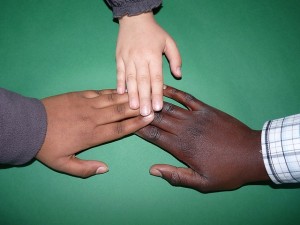Joshua Straub, Ph.D.
“Our lives begin to end the day we become silent about things that matter.” –Martin Luther King, Jr.
 As a parent, I believe racial reconciliation begins in the home. I’m primarily responsible for how my children view, and subsequently treat, others. The process of learning how to treat others begins early, first teaching our kids how to honor and obey Mom and Dad. Next, we teach them how to love and share with friends and siblings. As our children age, they begin to notice that others are different from them.
As a parent, I believe racial reconciliation begins in the home. I’m primarily responsible for how my children view, and subsequently treat, others. The process of learning how to treat others begins early, first teaching our kids how to honor and obey Mom and Dad. Next, we teach them how to love and share with friends and siblings. As our children age, they begin to notice that others are different from them.
I’m not talking just race.
- Boys are different from girls. We (parents), therefore, teach chivalry and respect.
- Some kids, like my cousin, need a wheelchair. We, therefore, teach empathy–and definitely how to have wheelchair races. Some of my greatest childhood memories.
- Other children are developmentally behind. We, therefore, teach courage–to stand for the bullied.
- Many other kids have less money or toys. We, therefore, teach generosity.
These things, and so many more, matter. Fellow parents, in honor of Martin Luther King, Jr., let’s not remain silent. Silence breeds ignorance. And ignorance is the enemy of compassion. I’m most generous when I understand another’s plight. I have more courage when I choose to see, not shield myself from, injustice. I’m more empathetic when I take time to listen to another’s story.
Jesus’ own words convict me. “If you love those who love you, what reward will you get? Are not even the tax collectors doing that? And if you greet only your own people, what are you doing more than others? Do not even pagans do that” (Matt. 5:46-47, NIV)? As parents, let’s today decide to raise kids who learn that real love begins when we start loving those who are different from us. Here are three ways we can begin doing that.
- Educate yourself on the issues
 Before pointing fingers, jumping to conclusions, stereotyping, or making generalizations about what we see on TV, we need to study the history of a situation. The racial tensions in America today are not exclusive events. They are instead intertwined in a very complex history and underlying current of injustice and discrimination.
Before pointing fingers, jumping to conclusions, stereotyping, or making generalizations about what we see on TV, we need to study the history of a situation. The racial tensions in America today are not exclusive events. They are instead intertwined in a very complex history and underlying current of injustice and discrimination.
We influence our children by our verbal and nonverbal reactions to the events that unfold. They pick up our attitudes, feelings, and especially our words. However, and I’m as guilty of this as anyone, those words are often spoken from bias and before we know the full truth. The definition of ignorance is “a lack of knowledge.” Let’s practice listening before we speak. Learning before we teach.
In the past year, I was invited into a multiracial group of men who respectfully discuss these issues from their vantage point. We read books and watch videos that stretch us. And though conversations are sometimes spirited, it’s Christ who unites us.
There are three sides to every coin. Let’s be parents who study all sides to educate our children on injustice and teach them what it means to love those who are different.
- Tell age-appropriate truth to our kids
We should never lie, minimize, or justify the reality of the injustice when our children ask about it. We do our kids no favors by minimizing a situation. Be discerning, but truthful, about injustice.
Pre K- Grade 4: Younger kids are not likely to understand the complexities of what’s going on as it relates to Black Lives Matter, police shootings, or other racial tensions in America today. However, there’s no better time than now to help them label emotions like fear, anger, disappointment, and anxiety. Though we may shield them from the violence on TV, they still pick up on our feelings and attitudes about the events. Be aware of how you’re communicating to them. This age is critical for developing empathy for others, and our kids model after us.
Grade 5-8: Middle school children are likely more aware of the details related to specific events. One of the best ways to engage conversation about current events is to discuss them in light of the racial history in America—where we’ve progressed and the challenges that remain. This is also a good time to respectfully familiarize our kids with the leadership challenges we face in government and public service.
High School: Chances are teenagers have strong opinions regarding these events. Instead of getting into debates about right and wrong in the situation or taking sides, guide the conversation on how they can take a more active role in being a leader in their community and a voice against injustice and oppression locally, beginning with their friends.
- Make Philippians 2:3 a family motto.
 If you’re a person of faith, have your children memorize this verse. Put it on a plaque in your house. Recite it every night with your kids before bed. Most importantly, live it.
If you’re a person of faith, have your children memorize this verse. Put it on a plaque in your house. Recite it every night with your kids before bed. Most importantly, live it.
Every conversation we have with our kids should be in the spirit of this verse:
“Do nothing from selfish ambition or conceit, but in humility count others more significant than yourselves.”
If I want my children to value human life, they need to see me, their Dad, practice what I preach. When I lie at night and sing with my kids—
“Red and yellow, black and white, they are precious in his sight. Jesus loves the little children of the world.”
—I pray they genuinely learn from the way I listen, discover, and stand as a voice against injustice, that all are created in the image of God.
In this way, I pray, as Dr. Martin Luther King, Jr. dreamed more than 50 years ago, we can raise our kids “in a nation where they will not be judged by the color of their skin, but by the content of their character.”
For this to happen, we must realize that justice begins not with “what will we do,” but with “what will I do?”
 Joshua Straub, Ph.D., is the President and Co-founder of the Connextion Group, a company designed to build relational connections between generations. As an advocate for parenting in the 21st century, his passion is raising the next generation to love and relate well. Josh speaks and writes on the two key ingredients necessary for building healthy families: intentional parenting and a loving marriage. He is the coauthor of God Attachment and The Quick-Reference Guide to Counseling Teenagers. Josh wakes up each day striving to love others better, starting with his wife, Christi, and their children, Landon and Kennedy Rae.
Joshua Straub, Ph.D., is the President and Co-founder of the Connextion Group, a company designed to build relational connections between generations. As an advocate for parenting in the 21st century, his passion is raising the next generation to love and relate well. Josh speaks and writes on the two key ingredients necessary for building healthy families: intentional parenting and a loving marriage. He is the coauthor of God Attachment and The Quick-Reference Guide to Counseling Teenagers. Josh wakes up each day striving to love others better, starting with his wife, Christi, and their children, Landon and Kennedy Rae.